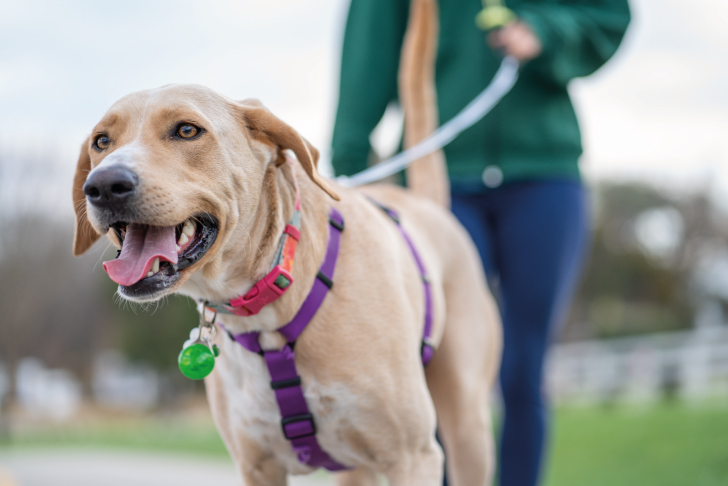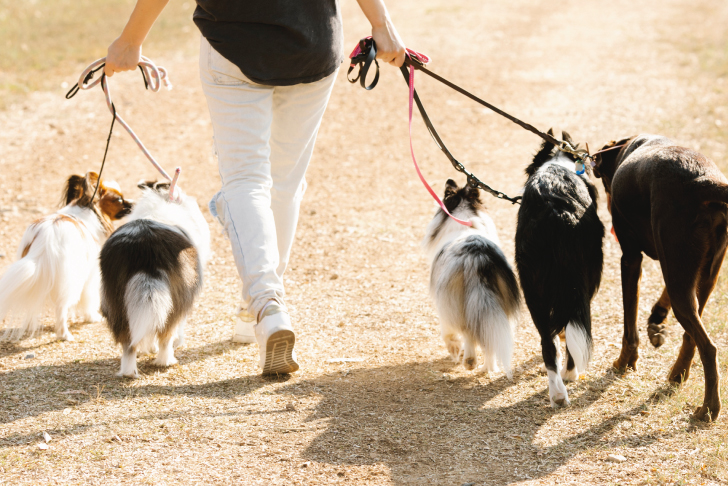Let’s start this guide with one fact we all know: the United Kingdom is a dog-loving country. Statistics confirm this, with 34% of households owning at least one dog. However, not everyone has the time (or energy) to offer their dogs some much needed fresh air, strolls, or – in most cases – ‘zoomies’.
This fact alone proves that starting a dog walking business can be a realistic, profitable, and flexible business venture.
This guide will explain why and offer a helpful breakdown of how to set up a dog walking business and how to become a great dog walker in the UK.
Is starting a dog walking business profitable?

We’ll start off with the most important question: how much does a dog walker make, and is it a profitable business? The answer is yes, starting a dog walking business can be profitable. The average price of a dog walker is £14-£17 per hour, depending on location, your specialisation, and how long you walk for.
It is possible to earn approximately $37,000 per year, but this can increase with more clients, frequent walks, niching down, and adding additional charges.
So, let’s do the math, and look at London as an example:
There are 10.2 million dogs in the UK, which means there is one dog for every 6 people. London has a population of around 8.9 million people.
8,900,000/6 = 1,483,333 potential dogs to walk!
Obviously, this is just gauging potential, but it gives you a sense of what your dog walking business income could look like.
Another important factor to note is that dog walking is recession proof, has a low barrier to entry, and it will always be in demand.
Find out more: Need funding? Check out our guide on small business grants.
Why should you start a dog walking business?
While starting a dog walking business sounds fun, it is still a business that requires certain skills and risk management. We’ll go over the benefits, risks and personality traits you’ll need to start a dog walking business in the UK.
Pros of starting a dog walking business
- Low start-up costs: becoming a dog walker in the UK requires minimal start-up costs, and you can produce profits in a short amount of time.
- Flexibility: starting a dog walking business offers flexibility that a 9-5 job wouldn’t. While you may need to work early or late hours, you’ll manage and plan your own schedule.
- Physical and mental well-being: not only can you walk yourself to an income, but you can also maintain your physical and mental well-being.
- It is scalable: by automating the way you operate, you’ll have the opportunity to grow and expand your business into new locations.

Cons of starting a dog walking business
- Weather: dogs don’t care if it’s raining, windy or negative three degrees, and unfortunately, you can’t either. Provided it is safe to do so, you’ll need to walk the dogs, come rain or shine. That’s where waterproof clothing, quality drying towels, and dog boots come in!
- Picking up after the dogs: this is self-explanatory. It’s crucial that you always have degradable bags and a poop scoop on hand.
- Varied income: a dog walking business income will vary. You may find that your schedule might not be consistent, and this could result in a decrease or increase in your monthly earnings.
- Risk and misbehaviour: some dogs may be destructive, high-energy or suffer from separation anxiety. This is something you’ll need to discuss with your clients, and insurance will be crucial. We’ll offer insurance advice later in the guide.
Personality traits of a dog walker
Regardless of the sector, an entrepreneur needs specific personality traits to succeed in owning a business. A dog walking business is no different. Here are some qualities you’ll need to start a dog walking business in the UK:
Comfortable around dogs:
An obvious quality you’ll need is to be comfortable around dogs. You’ll work with a range of different personalities, sizes and needs, so it’s important that you know how to handle them.
Patience:
Another common personality trait an entrepreneur will need in this industry is a patience for dogs. You’ll need to give attention to and care for them in comfortable and uncomfortable conditions.
You’ll also need to have the ability to deal with demanding clients. Most pet owners care deeply about their pets and will have unique requirements that you’ll need to abide by.
Responsible:
Owning a dog walking business requires multiple responsibilities. You’ll need to organise a schedule, ensure you have appropriate equipment, be prepared to deal with dangerous situations, provide first aid if needed – alongside running a real business.
Good communication:
Clear communication between your clients and their dogs is crucial. This is how you will understand and mitigate client concerns, calm dogs down, and ensure you run your dog walking business efficiently.
What are the start-up costs for starting a dog walking business?

The start-up costs for a dog walking business are low, ranging between £100 - £1,500! This amount will vary depending on how large you want your operation to be, and what equipment you purchase.
Some of the costs you’ll need to consider include:
- Liability insurance (we’ll get to this in the next step)
- A criminal background check
- Dog-walking equipment
- Marketing (traditional and digital)
- Business registration
We understand that having immediate access to start-up finance isn’t always possible, so we’ve created dedicated resources to help you. If you’d like to consider a grant, you can read our small business grants guide for guidance and tips on what funding is available.
If you’d prefer to take the lending route, you can read our guide on small business loans for helpful information on financing options. This guide does focus on finance to buy a business, but it includes helpful resources for loans in general.
How to start your dog walking business
Now, let’s get into the initial steps you need to take to start your dog walking business in the UK.
Step one: research your market
Starting any business requires market research to succeed. You need to understand the demand and pricing strategies within your local area. Start by doing a Google search and type in ‘dog walking business near me’. From here, you can conduct an analysis on:
- Who your competitors are
- The areas they cover
- How they market themselves
- What their pricing model is
- What their unique selling propositions are
- What their reviews say
For example, if you want to become a dog walker in London, you’ll face stiff competition. But you can also charge higher rates and gain access to more clients.

Step two: do you need qualifications to be a dog walker?
While you are not required to undergo any formal dog walker qualifications, we do strongly encourage you to consider taking dog walking training courses.
Gaining this knowledge and applying it to your business will positively impact your reputation and give your brand credibility. The Insitute of Modern Dog Trainers provide multiple courses that are trustworthy and cost-effective.
The National Association of Pet Sitters and Dog Walkers is another brand you can take dog walking courses through.
Likewise, we recommend that you become a qualified first aider for pets. First aid courses for pets are widely available.
Step three: understand dog walking rules and regulations
You’ll need to be aware of and abide by the following rules and regulations:
- The Control of Dogs Order 1992: dogs need to wear collars in public that have the contact details of their owner.
- The Dangerous Dogs Act 1991: a dog cannot be out of control (for example, jumping up on someone or a child) in a public setting.
- The Clean Neighbourhoods and Environment Act 2005: you can be fined up to £1,000 if you do not pick up after the dogs, let them off their lead in a public space, or allow them into areas where no dogs are allowed.
Other dog walking rules include:
- Keeping your client’s personal information protected
- Meeting the dog’s owners before your first booking
- Walking a maximum of four dogs at a time
- Keeping track of all your appointments and logging the work you’ve undertaken
- If you plan to board the dogs you walk, you will need to get a boarding licence from your local council.
Step four: insurance and criminal checks
Lastly, you may be wondering if you need insurance to be a dog walker. The answer is yes. Insurance for dog walking businesses is crucial!
You should ensure you have public liability insurance to protect yourself if an incident happens in public. You’ll also need to obtain a basic criminal record check to prove your credibility.
Setting up your dog walking business
Now that we’ve gone through the first steps you need to take to kickstart your dog walking venture, let’s run through the process of setting up a dog walking business. This will include:
- Your dog walking business plan
- Registering your business
- Understanding self-employed income tax filing
- How much to charge and transportation
- Preparing contracts for clients
- Setting up a website domain
- Investing in dog walker essentials
Your dog walking business plan
Any start-up requires a detailed and clear business plan. The market research and competitor analysis you conducted in your initial steps should be included in this, along with details of how you’ll run your dog walking business. Don’t forget a SWOT analysis!
At this point, you should also start thinking about good names for a dog walking business. Artificial intelligence can help you generate dog walking business names.
Registering your business
Next, you'll need to register your dog walking business with the UK government. This is where your venture starts to become very real, and you’ll need to decide what your business structure will be (sole trader, limited liability, partnership).
Self-employed income tax for a dog walker
Dog walking is a business, so it’s important that you keep on top of your tax returns. You can file a Self-Assessment tax return on the UK government website.
How much will you charge, and how will you get around?
Depending on your location, credibility and specialisation, you can charge around £14-£17 per hour. However, it’s important to remember that dog walking does not have a standard, set rate.
It is imperative that you conduct local research to understand more about what potential clients will be willing to pay. Remember, you’ll be a new competitor that wants to grow your clientele, so think about offering discounts to your rates in the beginning.
Another factor to consider is your mode of transportation. If you don’t live near parks, fields or open spaces, you’ll need to invest in your own vehicle to transport the dogs to and from their homes.

Preparing contracts for clients
A dog walking contract is essential to running a successful and safe dog walking business. Some of the information you’ll need to include in your contract is:
- Your rates and additional services
- Booking and billing system
- Cancellation policies
- Insurance and liabilities
- Emergency and safety protocols
- Marketing permissions (social media posting)
- Exceptions (things you won’t include in your services)
Setting up a website domain
You’ll need to set up a website for your new dog walking business. This can be an overwhelming process, but luckily, many brands offer an integrated service that includes website building, email marketing, security, and more!
GoDaddy is a great platform to help you get started in the digital realm!
Don’t forget to invest time and creativity into designing your logo and dog walking business cards.
Investing in dog walker essentials
The last step you’ll need to take before you finally launch your dog walking business is to invest in quality dog walker essentials. Dog walking gear is important to protect yourself and the dogs in different conditions. Some equipment you should invest in includes:
- Poop scooper
- Biodegradable bags
- Pet first aid kit
- Dog paw cleaner
- Portable dog washer
- Quality leashes and harnesses
- Dog boots
- Dog jackets or towels
How to grow your dog walking business
Once you’ve launched your dog walking business, you’ll need to turn your focus to generating new clients and promoting growth. Here are some important tips to help market your dog walking business:
Social media:
Social media should be a priority for you. You’ll want to generate brand awareness, drive traffic to your website, connect with your community and share your experiences.
‘Visual’ social channels are important here, particularly TikTok and Instagram!
SEO best practice:
This may not be your focus for now, but it should be in the future. Search engine optimisation is crucial to help you achieve high conversion rates. By optimising your website content, your brand can rank on the first page of Google search results.
Customer reviews:
Customer reviews are integral to maintaining your credibility. These testimonials will prove that you’re a reputable dog walker and you can include them on your website, dog walking business cards, flyers and social media channels.

Niching down:
Once you’re established, you could think about niching down to find particular clients who might pay more. For example, walking and caring for specific breeds, or including grooming and boarding into your services.
Find out more: Need more advice on this sector? Read our sector-specific articles.
Starting a dog walking business is not your only option
We hope that this guide to starting a dog walking business has been helpful, and we wish you the very best on this new venture.
However, it’s important that we provide you with other routes into business ownership that you may not have considered.
Buying an existing dog walking business offers multiple benefits, including an established customer base (both humans and dogs), equipment and vehicles, and a team that knows the ropes.
You can browse dog walking businesses for sale in the United Kingdom and decide if this route is more suitable to your lifestyle and objectives. If you are considering it, we recommend reading our buying a business guide for more tips and guidance on what the buying process looks like.
How to start a dog walking business checklist
- Ensure you have appropriate funds to start the business.
- Research your market and conduct a competitor analysis.
- Consider taking dog walking training courses.
- Understand the regulations and rules governing dog walking.
- Get public liability insurance and a criminal check.
- Create a concise business plan and register your business.
- Understand Self-Assessment tax returns.
- Prepare your rates, transportation and client contracts.
- Set up your website.
- Invest in your dog walking essentials.
- Stay consistent with your marketing.
If you’d like to talk to someone from the team about starting your new business, or you need support with something else, please feel free to contact us.
We wish you nothing but success on your new business journey!
